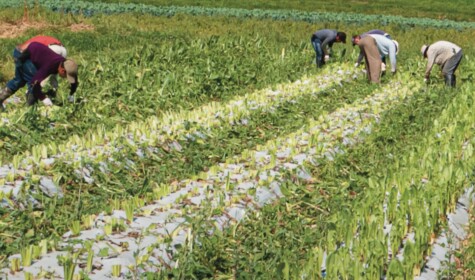Coronavirus hit the UK at the exact moment that the hungry gap arrived, when the winter crops have ended but before the new season’s plantings are ready to harvest. As growers across the UK begin to think about the coming months, there is a concern that the seasonal labour on which they rely will not be available. During peak harvest season, growers in the UK employ around 75,000 labourers, with an estimated 98% recruited from the EU and the majority employed in fruit and vegetable production. Most migrant labourers in horticulture come from Poland, Latvia, Romania and Bulgaria. However, the majority of these workers are now unable to travel from their home nations due to the ongoing border restrictions. Even if they could come, many are (understandably) scared to leave their families and come to the UK when the pandemic is still raging.
Due to the freedom of movement for the EU27, it is difficult to estimate how many temporary labourers are already in the UK and furthermore, it is impossible to estimate the number of undocumented or illegal workers. Regardless, it is clear that we are facing a shortfall of seasonal workers for the 2020 season, and without the labour to harvest the crops, many growers are concerned that they might have to leave crops in the ground. If we were to see such a decline in supply, there would be a significant knock-on impact on the price of the fruit and veg that was available, making healthy food more expensive and forcing some growers out of business.
Until the 1980s, seasonal jobs in horticulture were in large part done by UK students during university holidays. In fact, some of our readers might remember picking strawberries in Kent when they were students. However, in recent decades, students have increasingly chosen hospitality and retail jobs instead and those horticultural jobs have been taken by migrant labourers. With migrant labourers unable to travel, and hospitality jobs no longer available due to the lockdown, many farmers are hoping that students might try fieldwork instead. To support this effort, the Government has launched a campaign this week (in partnership with the NFU) to match university students and unemployed people with growers who need pickers to help harvest the crops. Currently, seasonal workers are paid the National Living Wage and many also receive a piece rate as a performance bonus in addition to their hourly wage, meaning that it might be an attractive option for those who have been furloughed due to Covid-19.
But there are big questions as to whether such a campaign will be successful in recruiting people. Horticulture jobs are perceived as physically hard and poorly paid with little opportunity for career advancement. There is also a sense that these are jobs for immigrants. It is a lot to hope that the public perception of this work will change overnight. Young UK workers might be more willing to consider jobs in horticulture if the roles were specifically connected to their generational priorities. Both the Millennial Generation and Generation Z (key targets for the Government’s new campaign) place significant emphasis on work that has social value. In fact, 63% of millennials expect their employers to contribute to a social cause. By portraying the necessity of these picking roles in the delivery of food security for the UK in a time of crisis, the Government would be able to appeal to the sense of purpose that university students want their work to have and make them feel that seasonal labour was essential in the battle against coronavirus.
Beyond the question of recruitment, is the question of training. These jobs are not unskilled, and require a high level of dexterity, efficiency and speed. An experienced picker can work at a rate that is 3 times faster than a new arrival and it can take many months to achieve the same level of knowledge, acuity and physical fitness. Due to the lack of training, it would be reasonable to budget for a significantly higher number of pickers in order to achieve the same yield. It’s worth noting that many of the supervisors and senior staff are also foreign workers who return year-after-year to the same farm, but who are currently unable to travel due to the Covid-19 restrictions. Without the expertise of these individuals, it will be more challenging to train new recruits and manage the picking teams. Given these factors, businesses could face a high drop-off rate, with new pickers leaving after a day or two. The high churn and repetitive training required will inevitably raise costs, which may be passed onto the consumer, impacting the price of food.
Due to the urgency of the situation, the SFT is working to support the impressive efforts that are going on around the UK.
- We are continuing to work with the Fruit & Vegetable Alliance to support the horticultural industry’s attempts to plug the migrant labour gap through a new matchmaking service.
- We urge you to sign onto the Land Workers’ Alliance new petition that calls on Government to build a Land Army to protect the UK’s food supply by offering business support for small farms and market gardeners and encouraging new entrants.
- For those of you with businesses, Organic Growers Association has created an online doc to connect small-scale agroecological growers and provide the support that they need, which might be helpful.
However, once this emergency has passed, it will be important to consider the lessons we can learn for the future. At the SFT, we hope we can convene a national conversation about how the UK can increase the production of domestic fruit and veg that have been grown in an environmentally sensitive way to ensure healthy and nutritious food for all citizens. The first steps of this work are already being taken and you can read director Patrick Holden’s blog on our plans here.







